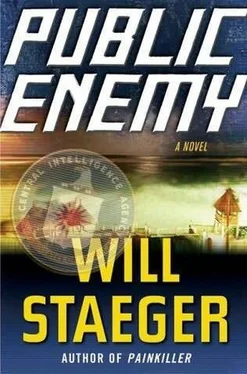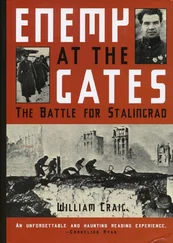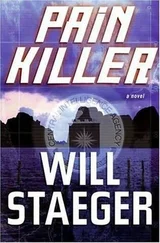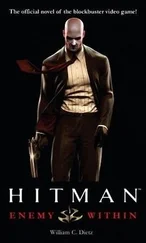Either way, the guy looked to Cooper as though he’d seen a couple too many James Dean or John Wayne films.
Cooper suspected this was the guard they’d seen manning the shack at the top of the hill. The cigarette, the way he held the gun-it had been a long-range view, but if he was right, and this was the only MP around, Cooper figured they had a pretty good chance of shooting their way out of here.
Making it all the way back to the boat was another matter.
“American, eh? Both of you,” the soldier said. His accent was there, but his English was strong-practiced, Cooper thought. Almost formal.
“Yes!” He regretted reaching for his gun so early-Rust comes in many forms, and this form might just get me killed. “This is our honeymoon. Backpacking trip.”
“Yes, yes,” the soldier said. “But this is military base. Prohibido el paso.”
They were almost a mile from the highway, which wasn’t visible ahead on the winding road. Unless they bolted for the woods, there wasn’t much to do but try to talk their way out of this.
“Is that right? We didn’t realize. Did we, honey?”
“No,” Laramie said. “Sorry, sir.”
“You like what you find? Strange, no?”
Cooper and Laramie avoided looking at each other.
“I will need your passports. You are under arrest.”
Cooper observed that despite the caustic tone of the soldier’s statement, the guy didn’t make move one to reach for their passports.
“No problem,” Cooper said, but remained still.
“How did you travel here?”
Cooper couldn’t find a good reason to make something up.
“Sailboat,” he said.
“Which is where,” the soldier asked.
Cooper motioned in the direction of the beach where they’d made landfall, trying out a measure of honesty to see whether it would get him anywhere. “A couple hours that way by bike. Not sure what the town is called.”
Laramie said, “Can we pay you for your trouble?”
Cooper raised his eyebrows-brash, but maybe it’d work. The soldier swiveled his head to her, then back over to train his eyes on Cooper again.
“It is almost dark,” he said. “When were you planning to leave?”
Cooper narrowed his eyelids at the direction the line of questioning seemed to be taking.
“Tonight,” he said.
“Are you CIA?”
“No, we were just married,” Laramie said, “and-”
“Yes,” Cooper interrupted. “Both of us.”
She turned to look at him as though he’d lost it. The soldier nodded.
“Where are you going on your boat?” he said.
“Southwest,” Cooper said. “Mexico.”
The soldier nodded again, and that was when the sun lost some of its power, a cloud, or the tip of a tree, obscuring enough of its declining rays so that Cooper could read the soldier’s face a little better.
Well enough, in fact, for him to see a couple things. First, how young this guy was-maybe twenty-five at most. He could also see the soldier’s scheming eyes-not much different from the look Cooper had seen from Po Keeler during their conversation across the half-ass Plexiglas shield.
Cooper grinned and threw it out there.
“We can take you as far as Cancún,” he said. “My friend here can arrange the rest. Assuming, that is, the final destination you’ve got in mind is north of the Florida Keys.”
Laramie turned to look at him-wondering exactly how that would work, he assumed. But he knew “the people she worked for” could find a way to pull it off.
The guy turned to look at Laramie again.
“Including paying me for my trouble,” he said.
Laramie glanced back at Cooper again with a look he decided he’d have to call priceless.
“Sure,” she said. “Including that.”
The soldier set his rifle on the passenger seat, took one last drag, then tossed the cigarette into the road.
“Climb in, Yankees,” he said.
It was ten after midnight in Knowles’s room at the Flamingo Inn. Rothgeb opened the door to let Laramie and her guide inside, at which point Laramie observed that Wally Knowles’s computer system had expanded to seize every available surface in the room. Newspapers and stacks of printed sheets of white paper stood in neatly organized partitions in the few portions of the space the computer system had failed to overtake.
All business, Laramie shut the door, said her hellos, and got right to briefing them on their discovery of the San Cristóbal theme park. She fed them the working theory-that Castro had rented the place out-then asked them to generate a list. The list, she said, should include whichever of Castro’s allies they believed to be the most likely theme park tenant. She and Cooper had gained little additional info on the theme park-outside of the patrol schedules and the long-term inactivity of the place-from the FAR refugee her guide had arranged to be flown from Cancún to Washington aboard a military transport, where he would be granted asylum after they held on to him for a bit.
Laramie then spent almost an hour walking her cell through their operative’s discovery of a possible connection between the genetically engineered M-2 filo, some sort of industrial facility in Guatemala that had been burned to the ground, and the lost Indian village that coincided, in place and time period, with the hemorrhagic fever outbreak the CDC had identified at the clinic in “rural Guatemala.” She told them about the letters “ICR” that Cooper had found on the piece of wood near the facility.
“If the connection is real,” she said, “let’s find it.”
Once she’d wrapped up, Laramie watched as Knowles, Cole, and Rothgeb looked at each other and came to some unspoken agreement.
Rothgeb then piped up as the cell’s newly appointed spokesperson.
“Why don’t you give us till nine A.M.,” he said.
Laramie did the math. “Eight and a half hours? That’s not much-”
“We’ve become something of a well-oiled machine,” Professor Eddie said. “And while you’ve been out on your Caribbean vacation, we haven’t exactly been sitting around with our proverbial thumbs up our rear ends. We’ve got some progress to report, but it’s probably better if we brief you all at once. Eight hours should be plenty of time to isolate the top theme park tenant suspects.”
Knowles nodded; Cole did too.
Laramie thought that she should have expected it-Rothgeb, assuming the spokesperson duties for her ragtag clan. She wondered idly whether he’d barged in as the pompous professor of diplomacy and foreign affairs he was-spokesperson, self-appointed-but couldn’t detect any animosity from Knowles, or tension from Cole. Strangely enough, she thought, it seems this dysfunctional bunch has in fact become a well-oiled machine.
She told them nine A.M. would be fine and left the machine to do its work.
They gathered in Laramie’s room-Laramie watching as her team arrived and its members chose their seats in approximately the same arrangement as the morning Laramie had given her introductory speech. Knowles perched on the edge of the bed; Cole, wearing shades today, took the chair near the door to the adjoining suite, where her guide was sequestered as usual. Laramie had the same chair at the room’s lone table, only this time around, Professor Rothgeb sat beside her at the table. Cooper was listening in on the device Laramie had decided to call the “spiderphone”-the odd-looking contraption her guide had employed for her first report to Lou Ebbers.
She introduced Cooper as, “Our operative, whose identity will remain classified.”
Rothgeb got right to it. For Laramie, it was a repeat of Foreign Policy 101-only with a sinister edge.
“In seeking to isolate who is most likely to have entered into a lease with Castro for the San Cristóbal theme park,” he said, “we took into account the following prerequisites, evidence, and variables. First: relationship. Whether head of state or rogue terror financier, he or she needs to have had some relationship with Castro ten to fifteen years ago. And while we all know Castro would probably take money from anybody interested in paying, he was clearly involved in some way here, and that means ideology’s gonna be key. That’s second on our list-ideology-since Castro wouldn’t have cooperated to such lengths without this guy being left of left. Third, and quite obvious: this person has a beef with America. Fourth: resources. It doesn’t take billions to build a stadium-size theme park, but it does take a few mill. Plus, our guy would need to be capable of recruiting, training, possibly maintaining, and absolutely paying his sleepers. In almost all cases, the families of suicide bombers are handsomely rewarded by the faction for which they make the supreme sacrifice.”
Читать дальше





![Томас Гарди - Джуд неудачник [Литрес, Public Domain]](/books/437392/tomas-gardi-dzhud-neudachnik-litres-public-domain-thumb.webp)






